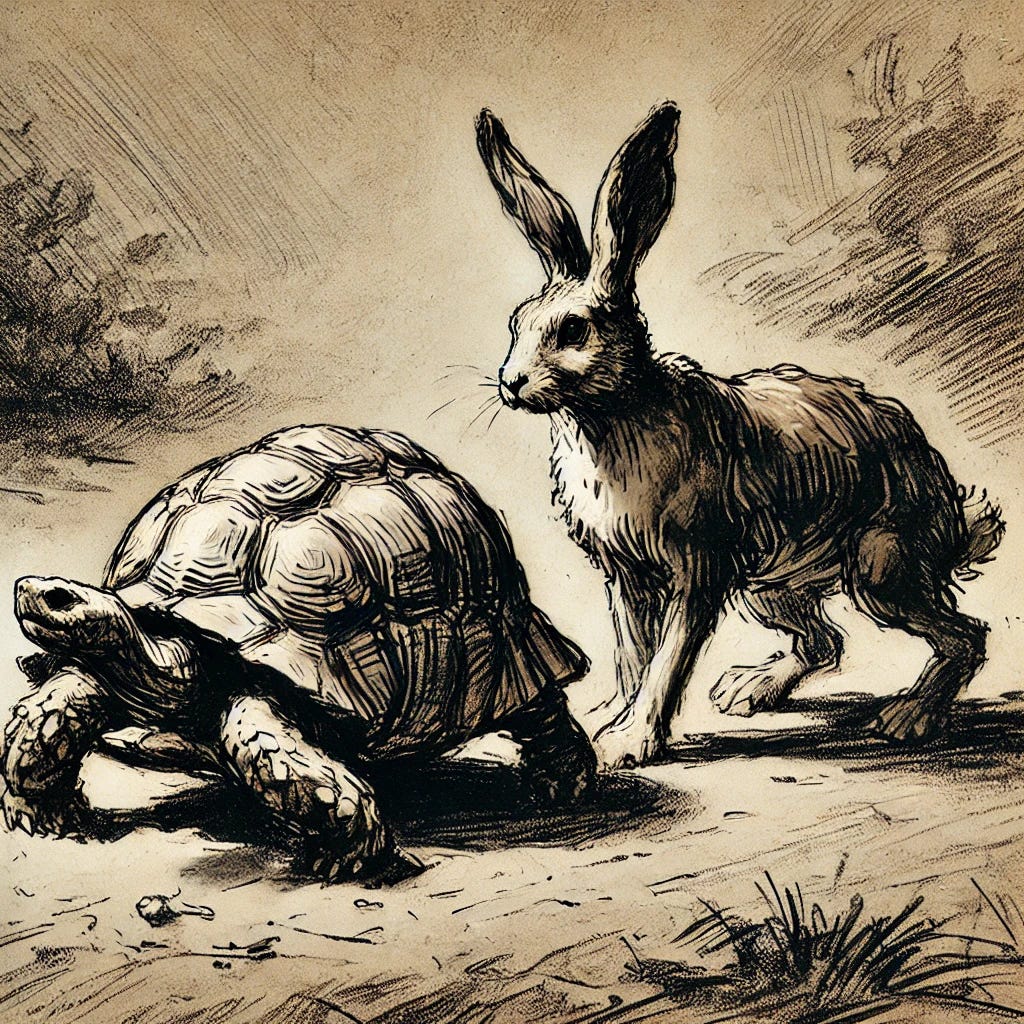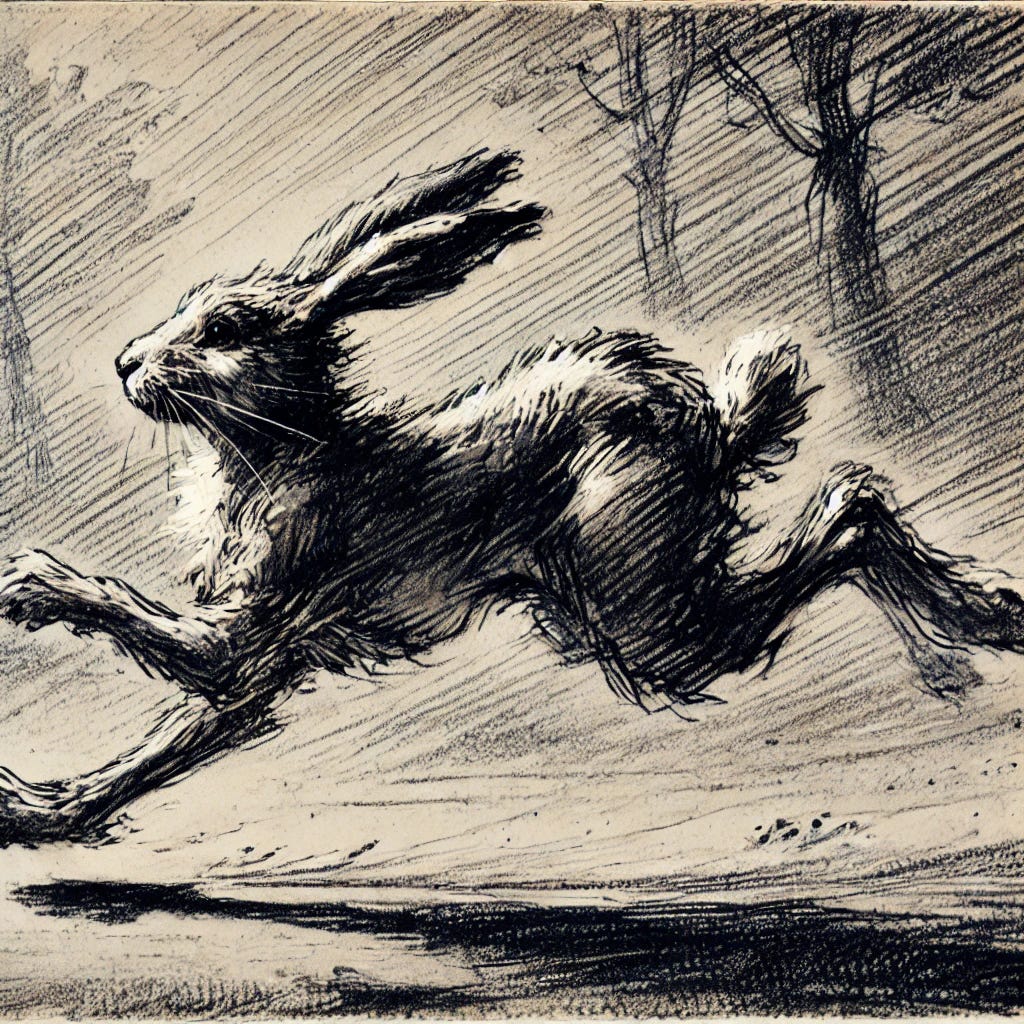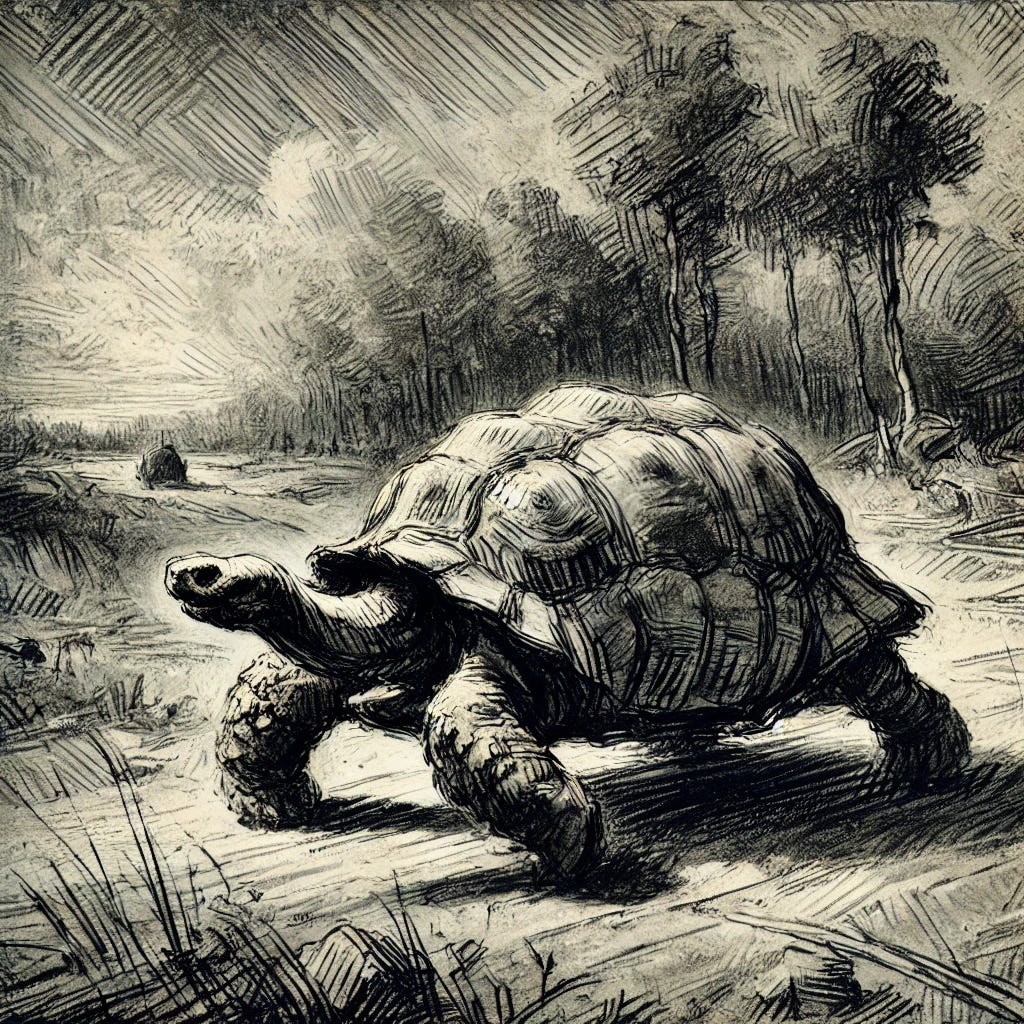Tortoise and the Hare: The Lesson of the Finish Line
Why life's greatest victories belong to the persistent.
This isn’t a story about racing. It’s a story about life, about how we move through it, and about the stories we tell ourselves as we do.
Hare’s Perspective
They don’t tell you how heavy it feels to run so fast. The weight of knowing you’ll win before the race begins, that no one can touch you. Speed is a kind of loneliness, a crown of feathers that no one else can wear, no matter how much they might try.
I was born to it, the swiftness. My legs stretched long before the others, my strides outpaced even the eldest hares before I was fully grown. It felt like flight. No—better than flight, because the earth still kissed my paws as I moved. The meadow blurred into streaks of green and gold, the wind sang against my ears, and I lived in the sharp, electric thrill of being first. Always first.
The others would cheer, but their eyes held something else too—something like resignation. No one could challenge me. And then came the tortoise.
He stood there, blunt-faced and gray, his shell mottled like old stone. "I’ll race you," he said, as if the words themselves weren’t absurd.
The meadow erupted into laughter, mine the loudest of all. "You?" I said, my voice breaking with incredulity. "You’ll race me?" I stepped closer, towering over him, my shadow casting his small frame in darkness. "Do you even know what you’re asking for?"
"I know," he said simply. His eyes were dark and steady, as if he were looking not at me, but through me.
So I agreed. What else could I do? Refusing would have made me look small, and I was not small. I was the hare, the fastest creature in the meadow, the fastest creature anywhere. The race would be over in minutes.
We stood at the starting line the next morning, the grass damp beneath my paws, the air cool and sweet with the scent of dawn. He stood beside me, unmoving as a rock, his shell dull in the early light.
The signal came, and I was off. My legs pushed against the earth, launching me forward in great, bounding leaps. The ground melted away beneath me, and the wind was mine again. I didn’t look back. I didn’t need to.
By the time I reached the hill, I couldn’t even see him. I laughed aloud, the sound wild and full of pride. This wasn’t a race—it was a farce. Why waste my energy on something already won?
An oak tree stood nearby, its branches spreading wide like a great, lazy yawn. I stretched myself out beneath it, the grass cool against my fur. The sun warmed me, and the soft drone of bees and rustling leaves lulled me to sleep.
When I woke, the sun was sinking low, its golden light spilling across the meadow. I stretched lazily, yawning. There was no rush. I would finish this whenever I pleased.
But as I crested the hill, my breath caught in my chest. There he was—the tortoise—moving forward, slow and steady, his head bobbing with each deliberate step.
I ran. Faster than I ever had before, the world a blur around me. My heart pounded, my muscles burned, and the wind screamed in my ears. But no matter how fast I ran, the distance between us didn’t close.
He crossed the line.
I skidded to a halt, panting, my chest heaving. The crowd erupted, but the sound was muted, distant. He turned to me, his gaze calm, unshaken.
"You could have beaten me," he said. There was no triumph in his voice. No mockery. Only truth.
The words were sharp as a blade. "But I didn’t," I said, my voice cracking.
I had thought the race was mine by right. I had thought speed was all that mattered. But speed is nothing without constancy. What good is a gift, I realized, if you waste it in arrogance?
The meadow fell silent as the tortoise moved away, his steps slow, measured, like the beating of a heart.
I stayed behind, my legs folded beneath me, my fur damp with sweat and shame. The sky turned to violet and the stars blinked awake. They looked down on me like cold eyes, indifferent to my failure.
That night, I understood the weight of what I carried. It wasn’t the swiftness of my legs that had burdened me. It was my pride.
Speed is a gift, yes. But humility is the ground it runs on.
Tortoise’s Perspective
The hare laughed at me. Of course, he did. Everyone did. His laughter was sharp and gleaming, like sunlight off a blade, cutting through the meadow air. I bore it as I always did—with stillness, with silence.
I’ve been slow my entire life. The kind of slow that people see as a flaw, a lack. I am the stone by the path, the shadow that stretches but never catches up. The others pity me, though they don’t say it outright. Their glances linger too long. Their smiles hold too much sweetness.
But pity is lighter than scorn, and the hare gave me no such mercy. His speed was a crown he never took off. His legs were quicksilver, his confidence a bonfire. And who was I to challenge him?
Yet, that day, I did.
“Why?” someone whispered after I said it. I heard the question ripple through the crowd of animals that had gathered. Why would I challenge the hare to a race? I heard no answer from them, and I gave none myself.
It wasn’t because I thought I could win. Not truly. It was because sometimes you need to be seen. Not pitied. Not mocked. Just seen.
The morning of the race was soft and golden, the kind of morning that makes you feel the world is listening. The grass clung to my feet, wet and cool, as I stepped to the starting line. The hare stood beside me, his fur shining like spun silver in the sunlight. He didn’t even look at me. I might as well have been a tree or a patch of earth.
The call came, and he vanished, swallowed by his own speed. The meadow sighed with admiration. I moved forward.
Step by step. The earth was firm beneath me, the kind of steady that reassures you with every touch. I didn’t think about how far ahead he was. I didn’t think about the crowd, or the murmurs, or the certainty of my failure. I thought only of my steps. One. Then another.
The world stretched out around me in a way it didn’t for him. I noticed the sway of the grass in the wind, the sparkle of dew on clover, the hush of the trees overhead. The hare would never have seen these things. They were too slow, too small, to catch his eye.
I heard when he stopped. The meadow fell quiet, and even the wind seemed to still. I didn’t look up. I didn’t turn back. I kept moving.
The sun dipped lower, casting long shadows across the field. My legs ached, my shell pulled heavy on my back, but still, I moved. Each step was a choice. Each step was a refusal to stop.
When I saw the finish line, it didn’t feel real. The hare wasn’t there yet. He had not caught me. For the first time, I allowed myself to believe.
The last steps felt like a dream, and when I crossed the line, the meadow erupted into sound—a rush of cheers, disbelief, and wonder. I stopped and turned, and there he was, his chest heaving, his eyes wide with shock.
“You’ve beaten me,” he said, his voice hollow.
I shook my head. “No,” I said softly. “You lost yourself.”
I meant it. He had every gift—the speed, the strength, the power to finish this race long before I could. But he had let it slip through his fingers like sand, distracted by his own certainty.
As I turned to leave, I heard the murmurs in the crowd again. This time, they weren’t about why I had raced. They were about how I had won.
But that wasn’t what mattered to me. What mattered was that I had kept going, even when the world told me I couldn’t. Step by step. Steady as the tide.
The hare’s speed had made him light, untethered, chasing the wind. But I was heavy, and the earth remembered me.
That night, under a sky heavy with stars, I rested my tired legs and closed my eyes. The meadow was silent, the way it always is when the day’s noise has settled. I slept soundly, as I always did, knowing that sometimes, it isn’t speed that wins the race. It’s knowing how to keep going, even when no one believes you can.
Lessons & Reflections - Digging Deeper
1. The Illusion of Speed
The hare’s greatest gift was his speed—his ability to move faster than anyone else. But that speed became his undoing. Why? Because it blinded him. Speed, unchecked, often does. In our own lives, how often do we rush, convinced that faster is better? Faster success, faster results, faster decisions.
But what does speed cost us? What details do we miss as we race through life? What relationships suffer because we think there will always be time to circle back? The hare teaches us that speed without mindfulness is a hollow gift. It creates distance—not just from others, but from the beauty, lessons, and meaning of the journey itself.
Let me ask you: What are you racing past? And if you stopped—truly stopped—what might you see?
2. The Power of Persistence
The tortoise, slow and steady, embodies the kind of persistence that we often undervalue in a world obsessed with instant results. His steps were small, deliberate, unremarkable. But he didn’t stop.
How many times in our lives have we stopped because we thought we weren’t enough? Because someone else seemed faster, stronger, more capable? The tortoise teaches us that it’s not about how fast you move, but that you keep moving. Persistence isn’t glamorous, but it is transformative.
If you feel behind—if you feel like life has left you struggling to catch up—remember the tortoise. Small steps, taken with intention, can carry you farther than you ever imagined. The question is not how fast you can go but whether you will take the next step.
3. The Weight of Pride
The hare didn’t lose the race because of his speed. He lost because of his pride. He thought he had won before the race even began. He thought he was untouchable, and so he stopped paying attention.
Pride, like the hare’s, whispers lies to us. It tells us we don’t need to try, that we are too good, too talented, too capable to fail. It convinces us to underestimate others and overestimate ourselves. But pride, unchecked, is a heavier burden than humility ever could be.
Ask yourself: Where has pride held you back? Where has it made you careless, blind, or stagnant?
4. Seeing the Long Path, Not the Short Race
The tortoise didn’t focus on the hare. He didn’t look at the gap between them or measure his success against her speed. He looked only at the path before him, step by step, inch by inch.
How often do we measure ourselves against others? Their careers, their families, their achievements? We treat life as if it’s a competition, as if someone else’s progress diminishes our own. But the tortoise shows us the power of focus—not on others, but on the path we are called to walk.
Your journey is your own. Let the hare run his race. Let him rush ahead. You are not here to compete with him. You are here to finish the path set before you, and the only pace that matters is your own.
5. Winning Doesn’t Always Look Like You Expect
The hare may have been faster, but he lost. The tortoise may have been slower, but he won. This simple truth disrupts so much of what we are taught to value: that bigger is better, that faster is more important, that talent will always triumph.
Winning in life often looks like resilience. Like humility. Like showing up every day and trying, even when no one is cheering for you. Winning can mean redefining success—not as a finish line, but as the courage to keep moving forward.
Think about this: What does "winning" mean to you? Is it something you can actually carry with you? Or is it fleeting, dissolving as soon as you reach it?
A Final Reflection: Who Are You in This Story?
We’ve all been the hare at some point. Overconfident. Distracted. Convinced that our gifts will carry us through without effort. And we’ve all been the tortoise—moving forward even when the odds are stacked against us, even when others doubt us.
But the truth is, most of us are both. The hare and the tortoise live within us, wrestling for control. The question is: Which one will you let guide you?
This story endures because it’s not just a fable—it’s a mirror. It asks us to confront who we are when the race feels easy and who we are when it feels impossible. It reminds us that speed is meaningless without direction, and that progress—no matter how slow—is still progress.
Lesson Plan: The Tortoise and the Hare
Theme: Persistence, Humility, and the Power of Slow and Steady Progress
Duration: 45 minutes
Age Group: Mixed-age groups (adaptable for children aged 6-12)
Learning Objectives
By the end of the lesson, students will:
Understand the moral of The Tortoise and the Hare through storytelling and discussion.
Reflect on the importance of persistence, humility, and focus.
Identify ways to apply these lessons in their own lives.
Materials Needed
A printed or illustrated version of The Tortoise and the Hare.
Drawing paper, markers, crayons, or colored pencils.
A small tortoise figure or toy and a hare figure (optional for visuals).
"Steps of Progress" activity worksheet (described below).
A chalkboard, whiteboard, or poster paper for group reflections.
Lesson Outline
1. Warm-Up Activity (5 minutes)
Purpose: Set the tone and engage curiosity.
Ask: "Have you ever felt like someone else was faster or better at something than you? How did that make you feel?"
Share: "Today, we’re going to learn a story about two animals—a very fast hare and a very slow tortoise. But the slow one teaches us a big lesson."
2. Storytelling (10 minutes)
Purpose: Introduce the narrative in a rich and engaging way.
Read The Tortoise and the Hare aloud. Use expressive tones, especially to emphasize the hare’s confidence and the tortoise’s steady perseverance.
After reading, ask the children:
"Why do you think the hare decided to take a nap?"
"What made the tortoise keep going, even though he was slow?"
3. Reflective Discussion (10 minutes)
Purpose: Draw out the story’s deeper lessons.
Ask Thought-Provoking Questions:
"What do you think it means to be persistent?"
"Why do you think the hare lost, even though she was faster?"
"Have you ever achieved something by working slowly but steadily?"
Link to Real-Life Examples:
Share a story of persistence, such as learning a skill, practicing for a performance, or completing a school project.
Encourage children to share their own experiences.
4. Activity: Steps of Progress (15 minutes)
Purpose: Help children internalize the lesson through a hands-on activity.
Instructions:
Hand out the "Steps of Progress" worksheet or drawing paper.
On the sheet, have children draw a path with stepping stones or footprints leading to a finish line.
Ask them to think of a goal they want to achieve (e.g., learning to ride a bike, reading a book, practicing kindness).
On each "step," they’ll write or draw one small action they can take to move toward that goal.
Example: If their goal is to learn to ride a bike, the steps might be: "Put on my helmet," "Practice balancing," "Try riding with training wheels," etc.
Once completed, they can decorate their path and share their goal with the group if they feel comfortable.
5. Closing Reflection (5 minutes)
Purpose: Reinforce the moral and encourage personal growth.
Gather the children in a circle.
Say: "The tortoise won the race because he believed in small, steady steps. The hare lost because she let pride distract her. We can learn something from both of them: We don’t need to be the fastest or the best. What matters is that we keep going and don’t give up."
Ask each child to share one small thing they’ll do this week to "keep going," just like the tortoise.
Extension Ideas
Craft Activity: Have children create tortoise and hare masks or puppets and act out the story.
Outdoor Race: Organize a playful race where one group is encouraged to "rush" like the hare and another to "walk steadily" like the tortoise. Reflect on the outcomes together.
Family Challenge: Encourage families to choose a goal they can work toward together, one small step at a time.
Reflection for Parents and Teachers
After the lesson, ask yourself:
Did the children engage with the themes of persistence and humility?
How did they relate the lessons to their own experiences?
What opportunities can you create to reinforce these lessons in everyday life?




